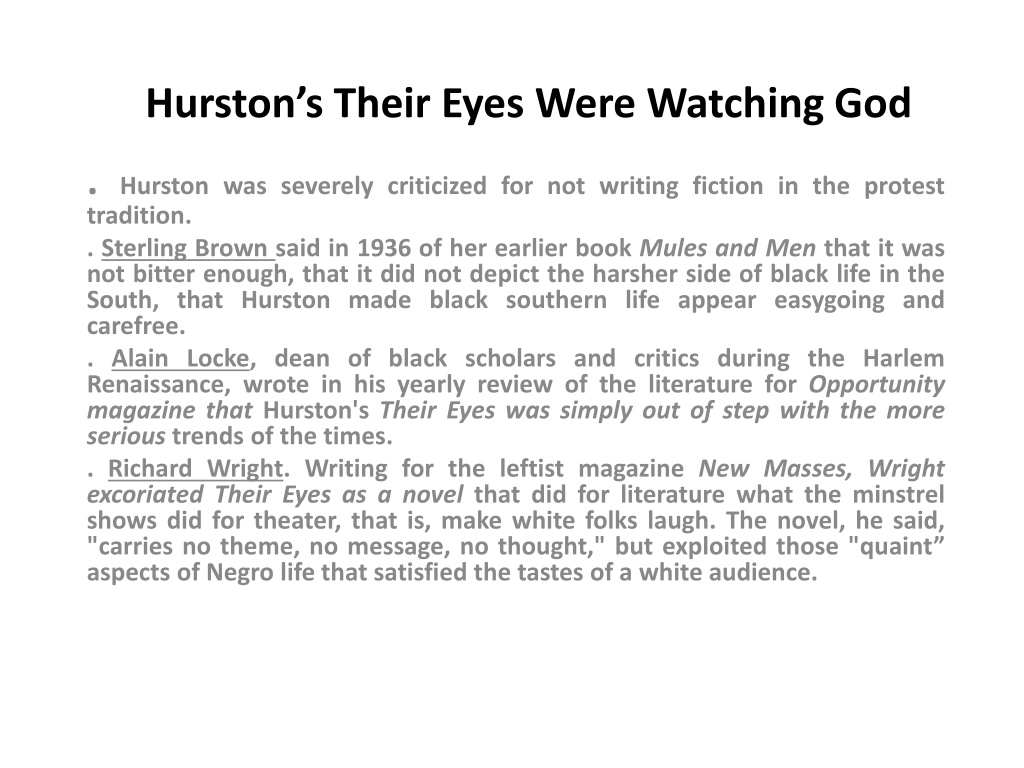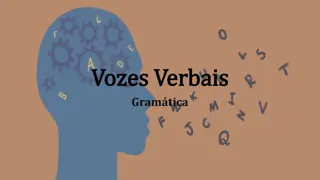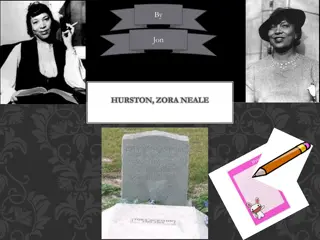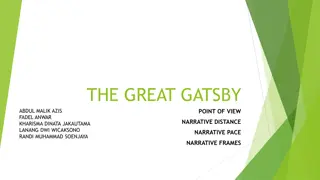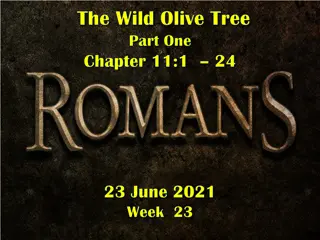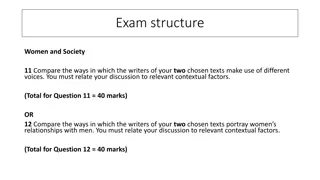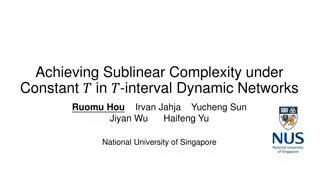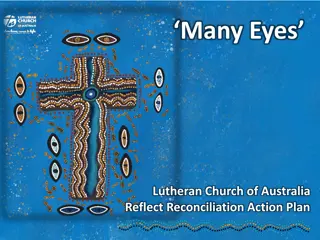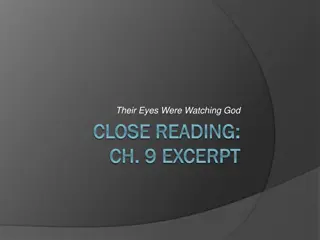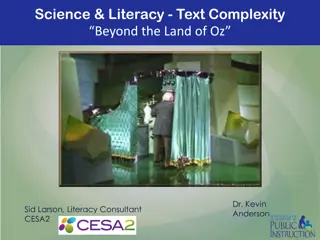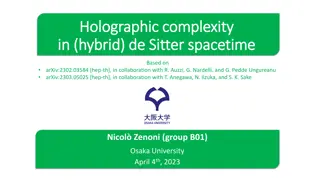The Complexity of Narrative Voices in "Their Eyes Were Watching God
Zora Neale Hurston's novel "Their Eyes Were Watching God" faced criticism for not conforming to traditional protest literature styles. The narrative features a compelling protagonist, Janie Crawford, who defies stereotypes of black women in literature. Hurston skillfully employs a dual narrative style, alternating between literary and colloquial language, to explore themes of power, identity, and the significance of language control in shaping one's voice and agency.
Download Presentation

Please find below an Image/Link to download the presentation.
The content on the website is provided AS IS for your information and personal use only. It may not be sold, licensed, or shared on other websites without obtaining consent from the author. Download presentation by click this link. If you encounter any issues during the download, it is possible that the publisher has removed the file from their server.
E N D
Presentation Transcript
Hurstons Their Eyes Were Watching God . Hurston was severely criticized for not writing fiction in the protest tradition. . Sterling Brown said in 1936 of her earlier book Mules and Men that it was not bitter enough, that it did not depict the harsher side of black life in the South, that Hurston made black southern life appear easygoing and carefree. . Alain Locke, dean of black scholars and critics during the Harlem Renaissance, wrote in his yearly review of the literature for Opportunity magazine that Hurston's Their Eyes was simply out of step with the more serious trends of the times. . Richard Wright. Writing for the leftist magazine New Masses, Wright excoriated Their Eyes as a novel that did for literature what the minstrel shows did for theater, that is, make white folks laugh. The novel, he said, "carries no theme, no message, no thought," but exploited those "quaint aspects of Negro life that satisfied the tastes of a white audience.
Hurstons Their Eyes Were Watching God The novel tackles the black folk traditions in the South. was a woman on a quest for her own identity and, unlike so many other questing figures in black literature. readers discovering Their Eyes for the first time, what was most compelling was the figure of Janie Crawford powerful, articulate, self-reliant, and radically different from any woman character they had ever before encountered in literature. it was about a woman who wasn't pathetic, wasn t a tragic mulatto, who defied everything that was expected of her, who went off with a man without bothering to divorce the one she left and wasn't broken, crushed, and run down. The novel uses the vernacular language of the South. It uses the rural language which is much familiar to simple black people.
Hurstons Their Eyes Were Watching God Their Eyes Were Watching God begins at the end of the story: we first see Janie after she has already grown old, concluded the adventures that she will relate, and been tuh de horizon and back. Her story then spins out of her own mouth as she sits talking to Pheoby. From the very beginning of the book, then, language plays a crucial role. the control of language proves crucially important. It introduces the important and complex role that language and speech will play throughout the novel. One of the most commented-upon aspects of the novel is Hurston s split style of narrative. The book begins in an omniscient, third-person narrator s voice, one that is decidedly literary and intellectual, full of metaphors, figurative language, and other poetic devices. This voice anchors the entire novel and is clearly separate from Janie s voice. Hurston splits the narrative between this voice and long passages of dialogue. These passages are marked by their highly colloquial language, colorful folksy aphorisms (sayings) ( Unless you see de fur, a mink skin ain t no different from a coon hide ), and avoidance of Standard Written English. These unusual passages celebrate a rich folk tradition that is not often expressed on the page.
Hurstons Their Eyes Were Watching God The oscillation between Standard Written English and Black Vernacular English mirrors one of the novel s central themes: the importance of controlling language. Throughout the book, we see Janie struggle with her own voice and control of language. Hurston uses the two voices in her text to celebrate the psychological fragmentation of both modernity and of the black American . Hurston colors the narrator s sophisticated prose with colloquialisms. She gathers the use of metaphor and symbolism. The voice of the narrator as the third person-narrator shows the delight in presenting the novel in a form of storytelling. Although it was the voice of Janie, but it looks like a separate one that belongs to the folk who talks standard language and colloquial. Because of these qualities, the narrative voice is more than just the absence of dialect; the narrator has a personality that is related, though not identical, to those of the characters.
Hurstons Their Eyes Were Watching God In Chapter 2, an important symbol is introduced: Janie s moment under the pear tree is a defining moment in her life and one that is referenced throughout the book. This experience relates symbolically to several themes: most obviously, Janie resonates (rings) with the sexuality of the springtime moment, and for the rest of the book, the pear tree serves as her standard of sexual and emotional fulfillment. the tree seems to mirror traditional gender stereotypes: the tree (the female) waits passively for the aggressive male bee who penetrates its blossoms. But Hurston s careful language tweaks stereotypical notions of the female role. Although the tree waits for the arrival of the bee, the love embrace is reciprocal. Janie doesn t want a male identity but rather a female one to parallel a male one; in the natural world, male and female impulses complement each other, creating a perfect union in a mutual embrace. Each gives the other what the other needs but does not yet possess. This ideal of love and fulfillment is at the center of Janie s quest throughout the book. Janie is searching for a deeper kind of fulfillment, one that offers both physical passion and emotional connection. Both the physical and emotional are important to Janie and inseparable from her idea of love. When explaining why she doesn t love Logan, she first mentions how ugly she thinks he is. She then mentions how he doesn t speak beautifully to her. She feels no connection to him neither physical, nor emotional, nor intellectual.
Hurstons Their Eyes Were Watching God Jody, on the other hand, seems to offer something more: he spoke for far horizon . the horizon is an important symbol. It represents imagination and limitless possibility, the type of life that Janie wants as opposed to the one that she has. It also represents the boundary of the natural world, the border of God s kingdom: Janie knew that God tore down the old world every evening and built a new one by sun-up. It was wonderful to see it take form with the sun and emerge from the gray dust of its making. What lies beyond the horizon remains unclear; Janie doesn t know what to expect of Jody and the new life that he offers her. In fact, she is only certain of what he doesn t offer: he did not represent sun-up and pollen and blooming trees. . . . These are the figures of Janie s youthful romantic desires; she is willing to abandon or compromise these desires in exchange for the possibility of change. Power, particularly the type of power expressed by Jody, is a crucial theme. He talks about the future, travel, and conquest; to Janie, these ideas seem like ways to reach the far horizon. Jody Starks stands as a symbol of masculine aggression and power; he attempts to purchase, control, and dominate the world around him. Jody s manner of interacting with the world fails to translate into secure happiness and fulfillment for Janie. At this point, though, she is dazzled by the power Jody offers and believes that it can grant her a better life.
Hurstons Their Eyes Were Watching God: themes Their Eyes Were Watching God is primarily concerned with the project of finding a voice, with language as an instrument of injury and salvation, of selfhood and empowerment. Jody stifles Janie s speech, as when he prevents her to give her speech before the folk. He is named as mayor; her hatred of him stems from this suppression of her individuality. Tea Cake, on the other hand, engages her speech, conversing with her and putting himself on equal terms with her; her love for him stems from his respect for her individuality. she learns that silence too can be a source of empowerment. Means to Fulfillment. Janie asserts a place for herself by undertaking a spiritual journey toward love and self-awareness, Jody attempts to achieve fulfillment through the exertion of power. Jody tries to purchase and control everyone and everything around him; he exercises his authority hoping to subordinate his environment to his will. He labors under the illusion that he can control. even Tea Cake, for example, is filled with hubris as the hurricane whips up, certain that he can survive the storm through his mastery of the muck. For both Jody and Tea Cake, the natural world reveals the limits of human power. In Jody s case, as disease sets in, he begins to lose the illusion that he can control his world; the loss of authority over Janie as she talks back to him furthers this disillusionment. In Tea Cake s case, he is forced to flee the hurricane and struggles to survive the ensuing floods. This limit to the scope of one s power proves the central problem with Jody s power-oriented approach toward achieving fulfillment: ultimately, Jody can neither stop his deterioration nor silence Janie s strong will.
Hurstons Their Eyes Were Watching God: themes . Independence. Watching God is the story of how Janie achieves a strong sense of self and comes to appreciate her independence. But her journey toward enlightenment is not undertaken alone. Janie s quest for spiritual fulfillment is fundamentally a self-centered one. She is alone at the end yet seems content. She liberates herself from her unpleasant and unfulfilling relationships with Logan and Jody, who hinder her personal journey. Through her relationship with Tea Cake, fulfillment and enlightenment and becomes secure in her independence. She feels a deep connection to the world around her and even feels that the spirit of Tea Cake is with her. Thus, even though she is alone, she doesn t feel alone. Janie experiences true
